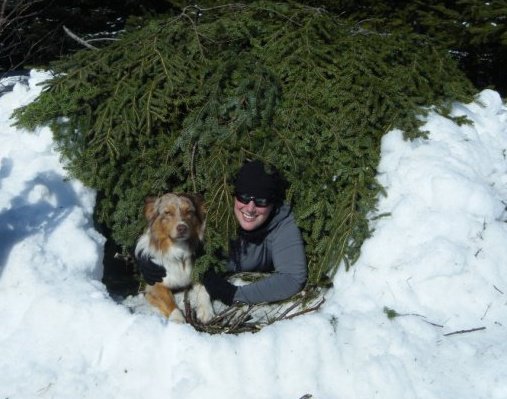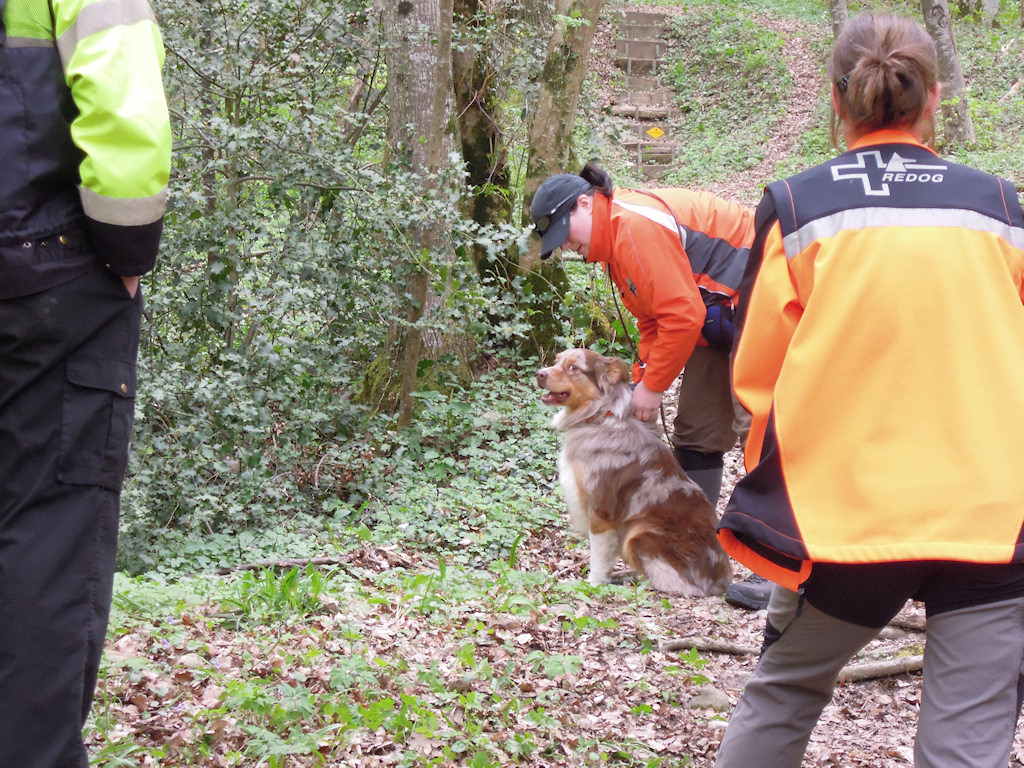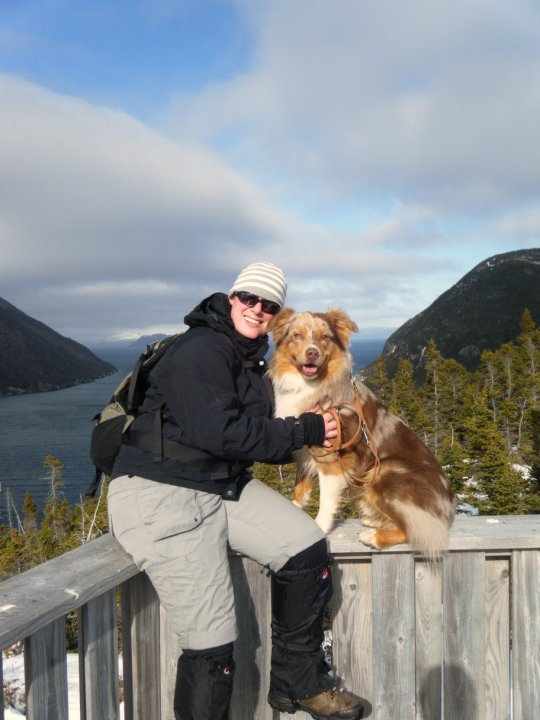… with Caryn Smith from Pasadena

Caryn Smith and her Australian Shepherd Cypher (Photo Caryn Smith)
Hi Caryn, why did you take your dog as far as Switzerland for training?
My dog Cypher is training to be a certified Search and Rescue dog. Our training coordinator is Swiss Canadian Bettina Lori who lives in Norris Point. We trained with the Swiss team and it was fantastic.
What did you learn in Switzerland?
There were specialists for dog behaviour. It was an exchange of ideas. It is interesting to see how it is done elsewhere.
How did you become a Search and Rescue Team with your dog?
I joined the Ground Search and Rescue first, then volunteered with the K9 Search and Rescue unit without a dog. I did not have a dog at the time. But I always had a passion for dogs and that kind of work.
How did you find Cypher?
I chose as Nova Scotia Duck Tolling Retriever named Gibson first. But a few months after I got him, one of the other members of the rescue group needed to find a new home for one of her dogs. My partner took over training with Gibson and I started to train with Cypher for Search and Rescue.

Caryn Smith with Cypher during a Search and Rescue training in Switzerland (Photo Caryn Smith)
Which dogs make good Search and Rescue dogs?
Dogs that are physically fit and are able to endure our environment, terrain and weather. What is most important: they have to have a drive for searching. For the dog, it has to be a game they get excited to play, otherwise they get bored. They need to be a bit independent but also rely on their owner or handler as well for instruction.
Are their breeds that are more suited than others?
A medium-sized athletic dog with the mentioned character traits can become a good Search and Rescue dog. Retrievers, herding dogs and even mixed breeds can be well suited. But it has more to do with personality and less with their breed.
Do the dogs have a certain age to start the training for Search and Rescue?
You can start training them from any age but it is best to start when they are puppies. Some people come with older dogs to our group for the obedience training and the socialization.
And the handlers, do they have to have a certain age?
If it is somebody who has the goal of certifying the dog, they need to become a member of a Ground Search and Rescue team first. For this, you have to be 18 years old. By being a ground search and rescue member first you are able to learn all of the skills that make a good searcher.
How did it work out with Cypher?
It was good with Cypher because he had already had some training. We sort of both knew how to do it separately but we had to learn how to do it together. We needed to learn how to communicate and read each other. We had to build trust as well.
How long does it take for a dog to become a certified Search and Rescue dog?
All depends on the dog and the handler. Dogs are certified by a panel. They are continuously trained even when they are certified.
Some people just do it for exercise, fun or for the dog to socialise with other dogs. And I guess, for people to social-ise with people.
How often do train him?
We try to train every second weekend for about 4 hours.
When will Cypher be certified?
Cypher was certified previously with his former owner. I hope we’ll be certified next year.
So have you been on a search with Cypher?
Not so far. Once we are certified and there is a search situation, if the RNC (Royal Newfoundland Constabulary), RCMP or Parks Canada staff choose that tool, our group’s dogs can be used. They have been used by the RNC and by Parks Canada on previous searches.

Caryn Smith with Cypher, 9 years old, male (Photo Caryn Smith)
But Cypher has a second job, doesn`t he?
Yes, Cypher is a certified Therapy Dog.
What is this?
The St. John Ambulance has a Therapy Dog Program. Myself and a few other dog enthusiasts have just started a program on the West Coast of Newfoundland.
Cypher already makes visits to one of the long-term care facilities in Corner Brook.
What is he doing there?
In these facilities, you find people who can no longer live without assistance (whether it be due to illness, brain or spinal injuries, Alzheimer’s, etc). Cypher visits with different residents, and they can pet him, talk to him, and give him treats.
Can these people relate to dogs?
Oh yes, some residents may not be able to communicate verbally anymore but they can communicate by touching the dog. There are proven benefits to therapy dogs. The interaction with these dogs improves the residents` mood, it can also help to lower blood pressure. Some people may have owned a dog before having to come to the long-term care facility. So a therapy dog is their replacement dog.
Thank you, Caryn.
Links:
Want your pet become a Search and Rescue dog?
Canine Search and Rescue Newfoundland
Learn more about the St. John Ambulance Therapy Dog program
www.sja.ca/NFLD/CommunityServices/Programs/Pages/TherapyDogServices.aspx

